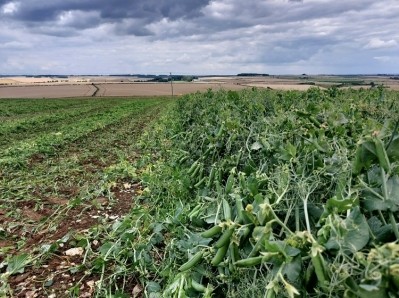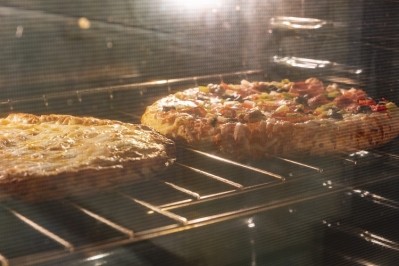WATCH: How Birds Eye grows, harvests, and processes its frozen peas
During harvest season, Birds Eye – part of Nomad Foods – can produce 48 tonnes of frozen peas per hour.
Achieving this capacity within a ‘just in time’ operation is no mean feat, suggested UK agriculture manager Richard Wilson on our recent trip to Birds Eye’s operations in Yorkshire, Northern England.
But the company does not just take pride in supplying the UK market with ‘sweet and tender’ frozen peas. Together with farmer cooperative The Green Pea Company (GPC), it is also incorporating sustainable agricultural practices into its cultivation, which feed into Nomad Foods’ ambition to reduce emissions by 25% in absolute terms by 2025, and achieve net-zero emissions by 2050.
“Pea cropping itself is very positive in terms of carbon,” explained Wilson. “It captures atmospheric carbon from the atmosphere and sequesters it into the soil.” Being a member of the legume family, peas are also nitrogen fixing – meaning that growers can reduce their use of synthetic fertiliser throughout the season.
The company is also reducing synthetic agricultural inputs by investigating the use of biologic fungicides, based on living organisms and natural compounds, that offer protection against pathogens.
Other sustainability initiatives include Birds Eye’s commitment to the Sustainable Agriculture Initiative (SAI) Platform, which sees it operate in accordance with principles designed to better the environment and society.
The changing climate is something the business is ‘very conscious’ of, said Wilson, who has observed less traditional seasonality and more volatility in weather patterns of late. “This year…has illustrated the point that we are looking at quite a changing climate. We have gone from having a very dry winter into February, which was one of the driest on record. What followed was the wettest March on record for 30-40 years, and then that followed into the warmest June.”
This can make planning the pea crop ‘quite difficult’, we were told: “It’s been quite a challenge.”
But looking forward, if adverse weather conditions continue, the company can pull levers in traditional breeding techniques. Nomad Foods owns a glasshouse production in Sellaberga, Sweden, where it identifies desirable characteristics in its pea seeds. “Drought tolerance could be a variety trait that we look to pick up more.
“If climate change and the extremes of climate are to become more of a figment of the future, then these are areas we’d be need to be looking into to.”
Watch the video to learn more about the cultivation, harvest, and processing of Birds Eye peas.

























